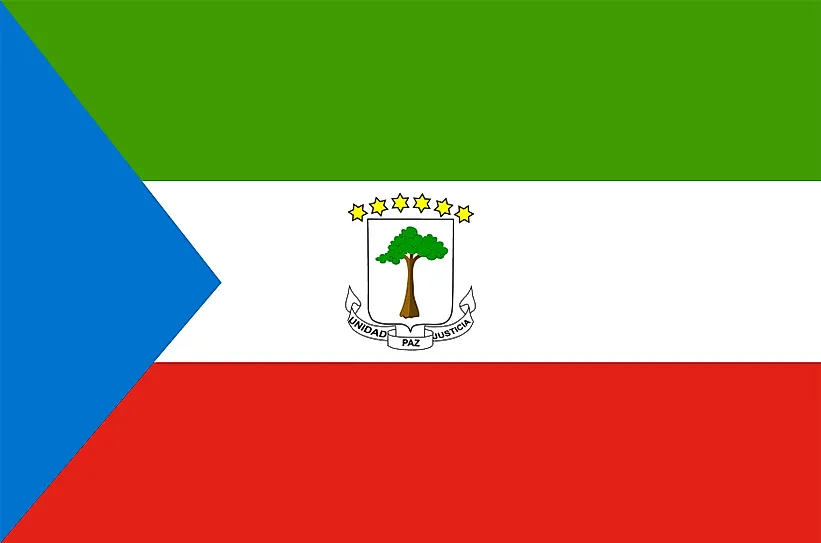
Equatorial Guinea
| Continent | Africa |
| Capital | Malabo |
| Population | 759,451 |
| GDP | $31.77 Billion |
| GDP per Capita | $38,700 |
| Dialing Code | +240 |
| ISO Code (2-letter) | GQ |
| ISO Code (3-letter) | GNQ |
About Equatorial Guinea
Welcome to Equatorial Guinea, a nation that combines mainland Africa with island territories in the Gulf of Guinea. With approximately 1.4 million people occupying 28,051 square kilometers, Equatorial Guinea blends Spanish colonial heritage with African traditions, creating a unique cultural mosaic in Central Africa.
Geographic Features and Natural Beauty
Equatorial Guinea’s geography encompasses both mainland territory (Río Muni) and islands, including Bioko (home to the capital Malabo) and Annobón. The mainland features dense rainforest, while Bioko Island showcases dramatic volcanic landscapes, including the 3,011-meter Pico Basile.
The Monte Alén National Park preserves pristine rainforest ecosystems and diverse wildlife, including gorillas, chimpanzees, and forest elephants. The country’s coastline offers beautiful beaches and marine habitats, while the volcanic islands provide unique ecological niches.
The tropical climate supports rich biodiversity, with numerous endemic species found particularly on Bioko Island. The country’s location near the equator creates consistent temperatures year-round, supporting lush vegetation and diverse ecosystems.
Cultural Heritage and Traditions
Equatoguinean culture reflects influences from various ethnic groups, including the Fang, Bubi, and Ndowe peoples, along with Spanish colonial heritage. The country is unique in Africa as the only nation where Spanish is an official language.
Traditional arts include wood carving, particularly masks and ceremonial objects, while music and dance play central roles in cultural life. The cuisine combines African staples with Spanish influences, featuring dishes based on cassava, plantains, and fresh seafood.
Religious practices blend Christianity with traditional beliefs, while traditional social structures continue to influence daily life. The country’s colonial architecture, particularly in Malabo, reflects its unique historical heritage.
Historical Journey
Equatorial Guinea’s history spans from early Bantu settlements through Portuguese and Spanish colonial periods to independence in 1968. The discovery of significant oil reserves in the 1990s transformed the country’s economy and development trajectory.
The nation has experienced significant changes in recent decades, transitioning from an agricultural economy to one of Africa’s major oil producers. This transformation has brought rapid development and urbanization, particularly in Malabo and the planned city of Oyala.
Modern Economic Landscape
Today’s Equatorial Guinea has an economy dominated by hydrocarbon production, making it one of Africa’s largest oil producers. The country has used oil revenues to develop infrastructure and diversify its economy.
Recent development initiatives include investments in education, healthcare, and infrastructure projects. The government’s Horizon 2020 development plan aims to transform the country into an emerging economy.
International Relations and Global Position
Equatorial Guinea maintains active participation in regional organizations and has developed partnerships focused on economic development. The country plays a significant role in the Gulf of Guinea’s maritime affairs and energy sector.
Did You Know?
• Equatorial Guinea is the only Spanish-speaking country in Africa?
• Bioko Island was once known as Fernando Po and served as a significant trading post?
• The country has one of Africa’s highest GDP per capita due to its oil wealth?
• The Monte Alén National Park contains some of Central Africa’s most pristine rainforest?
Conclusion
Equatorial Guinea represents a unique blend of African and Hispanic heritage in a rapidly developing setting. From its rainforest reserves to its volcanic islands, from its traditional villages to its modern cities, Equatorial Guinea continues to evolve while preserving its cultural diversity. As it addresses challenges including economic diversification and sustainable development, Equatorial Guinea remains committed to transforming its natural resource wealth into lasting development while maintaining its distinctive cultural identity.





